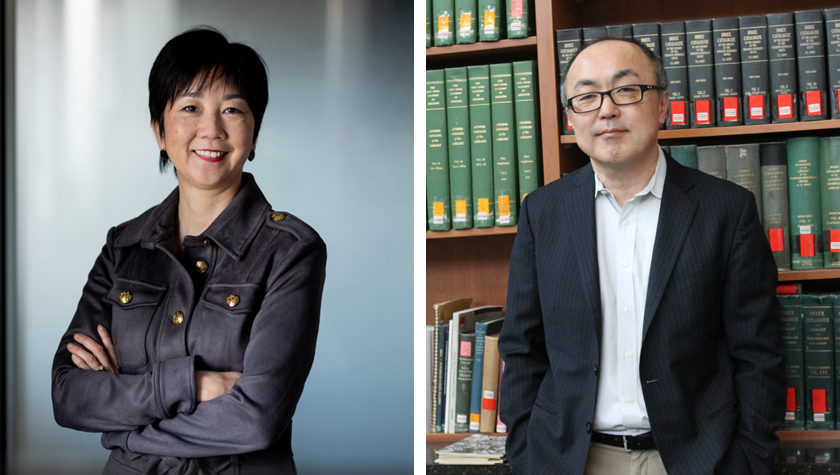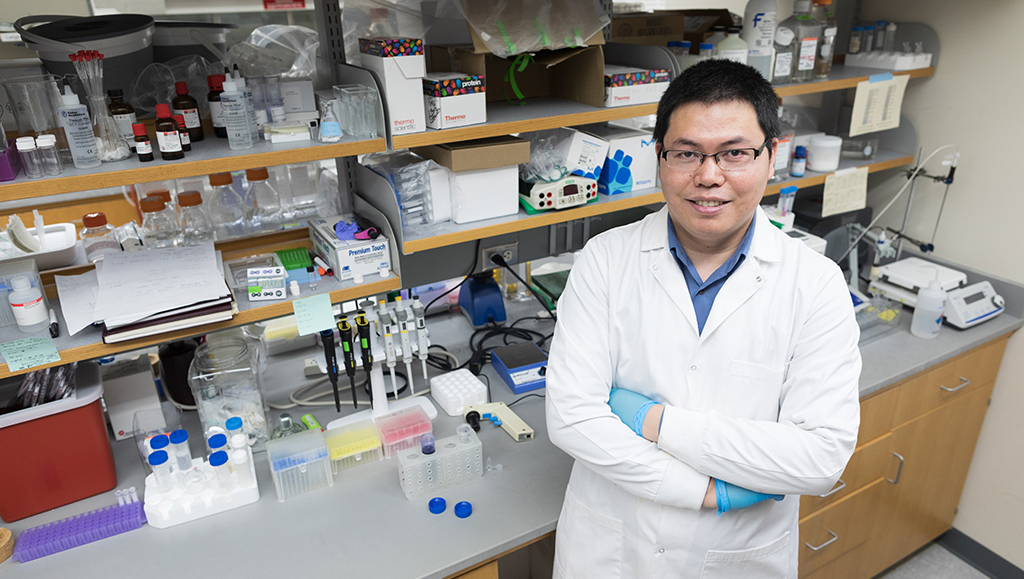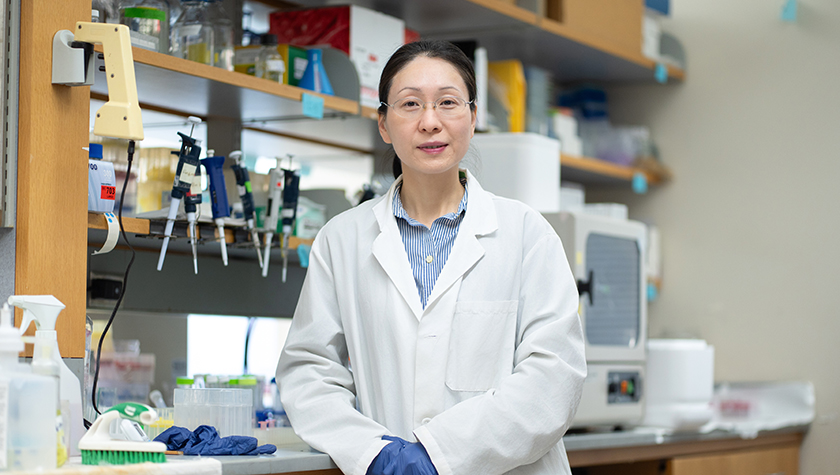
Professor Jiaoyang Jiang’s work on protein glycosylation is being recognized with one of UW–Madison’s top faculty honors
By Nicole Etter
Could the protein-modifying actions of two humble enzymes, OGT and OGA, be the key to unlocking more effective treatments for cancer, diabetes, Alzheimer’s disease, fibrosis, heart disease, and more? Jiaoyang Jiang, a professor of pharmaceutical sciences in the University of Wisconsin–Madison School of Pharmacy, has spent more than a decade chasing the answer to that question.
“We are interested in understanding how this chemical modification can be regulated and then how it becomes dysregulated or aberrant under those different disease conditions,” she says. “Through this, we hope to understand whether we can find some new drug targets or mechanisms that we can use to design potential drugs for the future.”
Now UW–Madison is honoring Jiang’s research accomplishments with a Vilas Faculty Mid-Career Investigator Award — a prestigious and highly competitive honor that reflects Jiang’s exceptional scholarly productivity, strong promise for continued achievement, and significant contributions to research. The award, designed to support outstanding faculty members who have 10 to 20 years in the field, provides recipients with three years of flexible funding.
“Jiaoyang’s teaching, service, and research activities have significantly impacted our students, the community, and science at the intersection of biology and chemistry,” says Steve Swanson, dean of the School of Pharmacy. “This Vilas honor underscores the far-reaching impact of her research and the promise it holds for transforming our understanding of disease and developing novel therapies.”
“This Vilas honor underscores the far-reaching impact of her research and the promise it holds for transforming our understanding of disease and developing novel therapies.”
—Steve Swanson
This is not her first recognition: In 2019, Jiang received the Vilas Faculty Early-Career Investigator Award. The annual awards are funded by the Trustees of the William F. Vilas Estate in honor of Vilas (1840-1908), a former UW professor and politician.
For Jiang, the award symbolizes a team effort.
“This is not about me; it’s about our team’s work,” she says. “It is a recognition of our research program and our School of Pharmacy. Without the support and the infrastructure from the School, both the leadership and my colleagues and all the staff, I don’t think it would have happened.”
Understanding powerful protein change agents
Jiang has spent her career studying protein glycosylation — sugar modification of proteins. Early on, she became fascinated by an essential and dynamic enzyme duo: OGT and OGA.
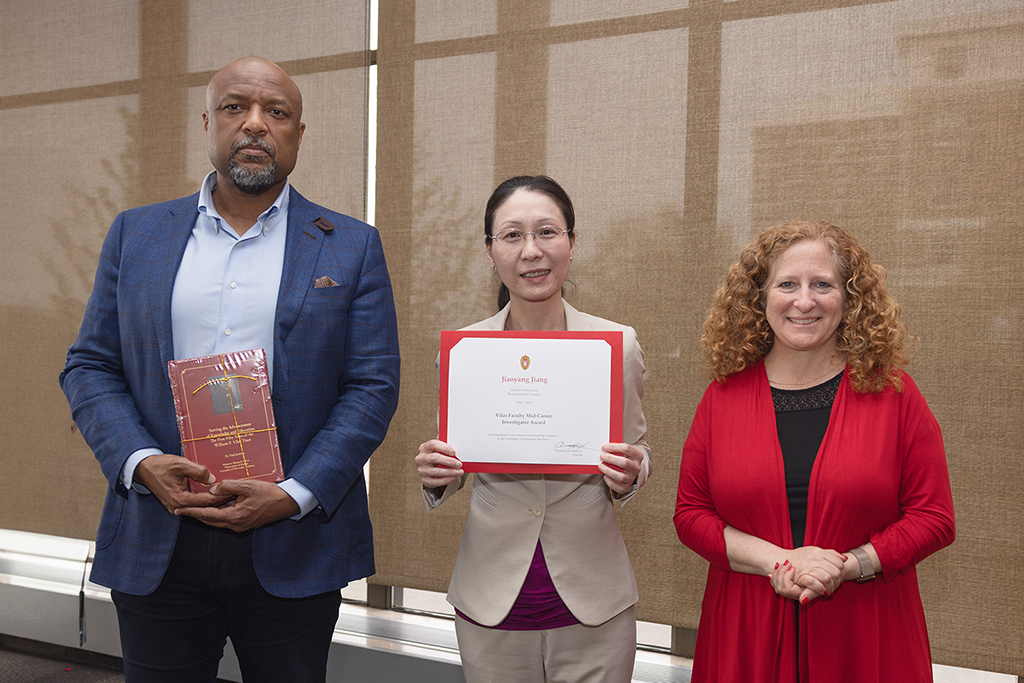
OGT transfers a sugar called N-acetylglucosamine (GlcNAc) to thousands of different proteins in the body, and OGA removes it — sometimes just minutes later. This modification, known as protein O-GlcNAcylation, can spring into action in response to nutrient and stress conditions.
Throughout her career, Jiang has worked to untangle the complexities of this ubiquitous process.
“Oftentimes the cell will try to use this modification to maintain the homeostasis in healthy conditions, but then if it becomes out of control, it can cause a lot of problems,” Jiang says. “It can be involved in the development or the progression of various diseases.”
Advancing the field
Since Jiang joined the School of Pharmacy in 2013, she has made important discoveries that have advanced researchers’ understanding of how this protein modification functions. One major milestone came in 2017, when the Jiang Research Group solved the first crystal structures of human OGA — a feat that had eluded scientists for years.
“We are one of the first in the field to provide a view of what the enzyme looks like and how it recognizes the different protein substrates,” she says.
When Jiang first began her career, few researchers were concentrating on protein O-GlcNAcylation. Since then, the field has grown rapidly as other researchers have recognized the potential for impact on a host of diseases.
Research has also been accelerated by the development of new, more sensitive techniques for detecting and quantifying protein glycosylation.
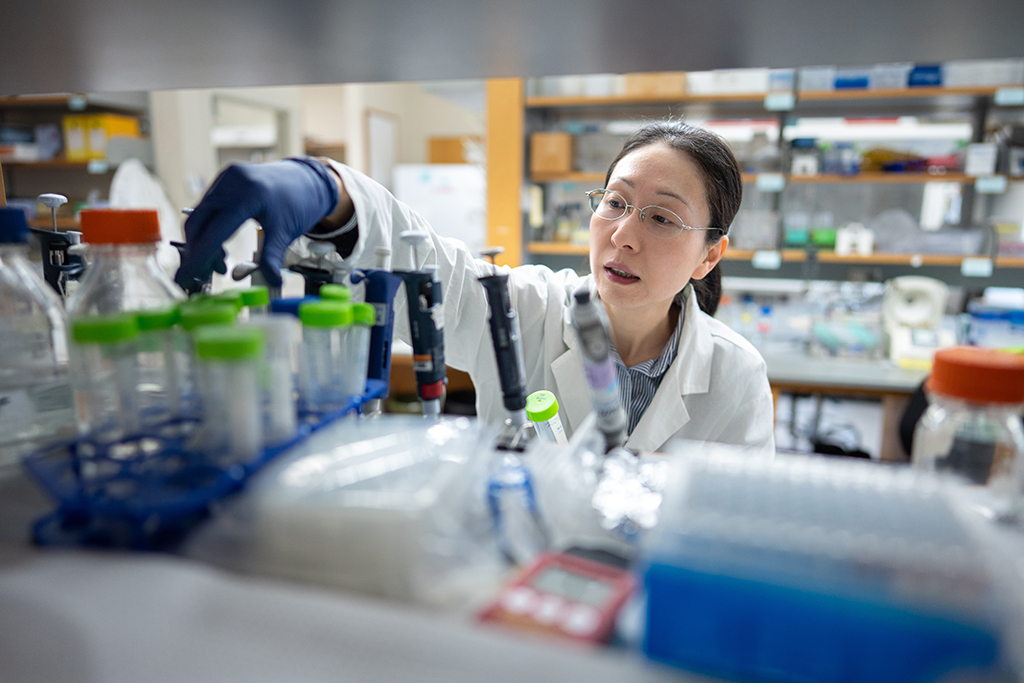
“This area has been challenging to study for a long time because even this modification has been difficult to detect with sufficient sensitivity or specificity using more traditional methods — for example, regular mass spectrometry or even antibody methods like Western blot,” she says.
In response, Jiang’s lab has developed chemical tools, such as inhibitors and crosslinkers, to study the enzymes and their interactions with their protein substrates in more detail.
“If we know OGT or OGA binds differently to some protein substrates/binding partners and that is more important or becomes mutated in disease, then we can target that more specifically,” she says. “This is a very important concept that we brought to the field.”
Jiang’s lab has also focused on identifying new regulatory mechanisms and disease pathways related to protein O-GlcNAcylation. Recent examples include their discoveries on a novel mode of OGT substrate recognition that regulates cellular response to nutrient deprivation and glucose metabolism, as well as a new role of OGA mutant in cancer cell malignant progression. Both works were in collaboration with other research groups, including Professor Lingjun Li’s lab in the School of Pharmacy.
Paving the way for new treatments
With support from the Vilas Award, Jiang will continue studying the specific binding interactions of OGT and OGA to find new drug targets.
“I think a more immediate goal is trying to understand how they bind to so many different types of substrates,” she says. “If we can find distinct binding modes used by OGT or OGA to interact with different types of substrates, we can target them more specifically. That could lead to safer and more effective treatment without compromising all the global activity of those enzymes because there are thousands of proteins that could be modified by this single pair of enzymes.”
Jiang’s work thus far has focused on cancer, and for good reason.
“Nearly every type of cancer has this modification become aberrant. It’s striking.”
—Jiaoyang Jiang
“Nearly every type of cancer has this modification become aberrant,” she says. “It’s striking.”
She is also eager to explore the modification in other disease models, including neurodegenerative and fibrotic diseases.
While there are no clinically approved drugs to target this protein modification yet, some are being tested in clinical trials. Jiang is hopeful that with more study, those drugs could become even more effective.
UW and the School of Pharmacy has been the ideal place to advance this work.
“We are very interdisciplinary here, and I think that kind of environment is really helpful,” she says.
